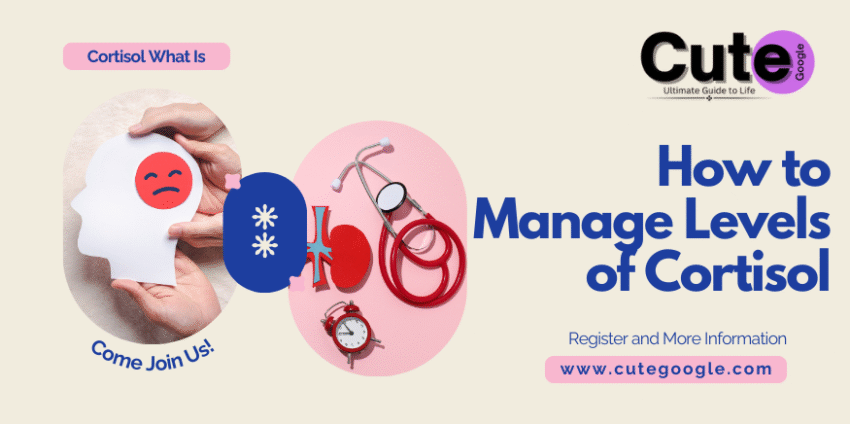Cortisol: What It Is and Learning How to Manage Levels of Cortisol for Improved Health
Everyone goes through stress from time to time. Stress can come in bursts or come in waves. Believe it or not, your body actually creates a hormone called cortisol to help with stress management. Cortisol is produced in your body and it’s more common now to see people asking, “cortisol what is it?” due to a desire to manage their energy, mood, appetite, and sleep naturally.
In this guide, we’re going to explain what cortisol is, its function and interaction with other hormones, consequences of high cortisol levels, signs that expose cortisol imbalance, and how to lower cortisol levels naturally and safely.
How Does Cortisol Work: What Is It Exactly?
Cortisol, the steroid hormone produced by adrenal glands located above kidneys, is often called the stress hormone. This is because it is secreted in excess during periods of emotional or physical stress. However, as we will see below, cortisol affects many other important functions in the body other than stress.
Cortisol assists in:
• Controlling metabolism
• Managing sleep patterns
• Curbing inflammation
• Controlling the utilization of carbohydrates, fats, and proteins by the body
• Cortisol balances with other hormones like adrenaline, as well as insulin
In simple terms, cortisol acts as a fuel in strenuous circumstances, such as when exercising, during an interview, or after a sudden shock. The trouble begins when high cortisol levels persist for an extended period of time.
Consequences of Excess Cortisol: The Effects of High Levels
Cortisol generally follows a natural circadian rhythm. Its level will spike in the morning to facilitate waking up and drop subsequently to aid transitioning to sleep. But chronic stress, inadequate sleep, excessive work, and poor nutrition can create an unhealthy state known as sustained elevated stress.
The following are symptoms associated with elevated cortisol levels:
• Chronic fatigue regardless of rest
• Increased body weight (notably in the abdominal region)
• Mood fluctuations, anxiety, or depressive episodes
• Difficulty paying attention (brain fog)
• Acne or fragile skin
• Increased blood pressure
• Low libido or irregular menstruation
Cortisol, insulin, and thyroid hormones can become unbalanced if one is persistently in “fight or flight” mode. This changes blood sugar levels, mood, and digestion.
Signs You’re Running on Empty: The Need to Lower Levels of Cortisol
All conditions stem from an imbalance within the body’s systems, and so does the case of running on empty: while too much cortisol can be harmful, too little can be equally concerning. Adrenal fatigue and Addison’s disease are two examples that can lead to lower than normal levels of cortisol.
Symptoms of low cortisol may include:
• Persistent low energy and fatigue.
• Nausea, muscle pain, or abdominal pain.
• Dizziness, particularly upon standing.
• Unexplained appetite loss or weight reduction.
• Cravings for salty food.
• Low blood pressure.
If you feel constantly tired and dizzy, it might be a good idea to get checked out by a healthcare professional.
Cortisol and Hormones: They All Interconnect
Your body’s hormone system (also known as the endocrine system) works like a system of texts being received and sent in real time. Cortisol is connected to numerous other hormones, including
*Insulin: Aids in the regulation of blood sugar. Excess cortisol can lead to insulin dependency.*
*Estrogen and Progesterone: Cortisol damage may imbalance reproductive hormones causing irregular cycles, PMS or infertility.*
*Thyroid hormones: High levels of cortisol may lead to an underactive thyroid (hypothyroidism), resulting in weight gain, lethargy, and other symptoms.*
*Melatonin: Cortisol inhibiting melatonin secretion can make sleeping at night difficult.*
If you are struggling with any symptoms related to the endocrine system, it would not be a surprise if cortisol is responsible.
How And When To: Check Cortisol Levels
Are you curious if your cortisol can be too high or too low? The only way you can know for sure is to get tested by a medical specialist.
Below are a few common methods to check cortisol levels:
1. **Blood Test**
• A blood test is mostly taken in the morning when one’s cortisol levels peak.
• A blood test can provide an indication of levels at that particular point in time.
2. **Saliva Test**
• It monitors cortisol in the morning, afternoon, evening, and even at bedtime.
• It aids in the detection of rhythms and inconsistencies throughout the cycle.
3. **Urine Test**
• A urine test is sequential and done within 24 hours.
• Provides better perspectives on daily yields.
In case your physician feels like there is an adrenal gland concern or a hormonal imbalance, it is almost obvious that one or more tests will be recommended to find out how well you are coping with stress.
Treatment for elevated cortisol levels needs to be investigated from a nonmedical perspective first.
If you learn that your levels are above the required numbers, there is no need to worry. The beneficial part is that changing your lifestyle and employing certain techniques can restore a balance.
Below are strategies aimed at reducing cortisol levels that have been shown to work:
1. Reduce Stress (Emotionally and Physically)
• PRactice relaxation techniques like deep breathing, meditation, or yoga.
• Take regular breaks from work and from staring at screens.
• Try journaling or talk to a therapist.
2. Step Up Your Sleep Hygiene:
• Try to get 7-9 hours to sleep
• Establish a fixed bedtime and wake-up time.
• Avoid caffeine and electronics before bed.
3. Maintain a Balanced Anti-Inflammatory Diet:
• Focus on whole foods like fruits, vegetables, whole grains, healthy fats, and meats.
• Avoid added sugar, a lot of processed foods, and caffeine.
• Avoid skipping meals, as low blood sugar can lead to spikes in cortisol.
4. Moderate Exercise:
• Going for a walk, swimming, and pilates are great exercises that won’t put a lot of strain on you.
• Avoiding overtraining and excessive cardio because these can raise cortisol levels.
5. Explore the Use of Adaptogens and Other Supplements:
• Herbs like ashwagandha, rhodiola, and holy basil may help with stress.
• Lowering inflammation and supporting adrenal function can be achieved by magnesium, omega-3s, and vitamin C.
6. Create healthy self-imposed limits
• Cancel any plans that are likely to increase stress.
• Avoiding work-life balance that does not necessitate self-care.
The overall goal is optimization of bodily functions relating to stress, resilience, and the body’s control over cortisol and hormones.
When Medication is Needed for Cortisol Imbalances
Sometimes, changes in lifestyle are not impactful. In the instance of having dangerously high or low levels of cortisol due to an underlying condition such as Cushing’s syndrome or Addison’s disease, your doctor might indicate prescription medications for elevated cortisol treatment or cortisol replacement therapy.
Such instances are uncommon, but they are serious. Therefore, it is essential to get help from a physician when your symptoms become severe or last for long periods of time.
Your Cortisol Game Plan: Finding Your Balance
Knowing cortisol – what it is, how it functions, and how it affects one’s body—is of paramount importance, especially on the road towards better health. So whether it be extreme fatigue, unexplained weight gain, or issues that are hormonal, cortisol might be the major player that you are overlooking.
Rebalancing cortisol and hormone levels is not solely lowering stress; rather, it requires developing a lifestyle that aligns with the body’s natural rhythms. Incorporating these principles can help:
• Rest and recovery
• Nutritive whole foods
• Emotional self-care stress management through mindfulness or therapy
• Gentle energizing movement
If you feel off, checking cortisol levels can provide clarity and help guide mindful care of physical, emotional, and hormonal wellness.
Final Thoughts
While required for bodily function, an imbalance of cortisol, like other bodily functions, can lead to concerns. Chronic Elevated levels may lead to sleep challenges and excess weight, while decreased levels can result in fatigue and lack of motivation. Through proper dietary choices and nourished movement, one can regain balance.
When unsure, always opt for a test. Gaining insights into hormonal health is vital for healing—there’s no questioning the right to feel one’s best every day.

